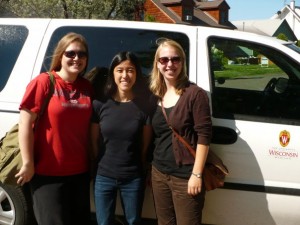An introduction to Indigenous information issues, the TLAM course is a graduate-level course that emphasizes Indigenous Knowledge and holistic learning within community.
It is designed to facilitate a participatory learning experience through presentations, readings, semester-long service-learning projects, and personal contact with tribal cultural workers.
The course is structured around a combination of classroom discussions, guest speakers, travel to American Indian communities, and attendance at events relevant to course topics.
Course History
The class emerged from independent study project in 2008 of three SLIS students––Chelsea Couillard, Christina Johnson, and Catherine Phan. Through funding from the Morgridge Center for Public Service’s Kauffman Entrepreneurship Community Internship Program and through SLIS, the students completed an interest and priorities assessment of the Red Cliff community to determine the potential role of the library on the reservation.
Through the work in this initial project, the students, along with new recruits have continued the experience by designing a course for SLIS: Tribal Libraries, Archives, and Museums. In this group independent study, the students have broadened their education and have sought to create relationships between SLIS, the Red Cliff community, the larger University, the library and information community, and other tribes and bands across the state.
The course evolved into one of the regularly occurring topics courses at SLIS. It is now offered yearly during the spring semester and has consistently generated increasing amounts of interest and enthusiasm among student, faculty, and the larger community. Topics covered include tribal histories; languages and storytelling; political and cultural sovereignty; Indigenous knowledge; the history of tribal libraries, archives, and museums; digital heritage; and international Indigenous issues.
Community engagement is central to the experience. Since the course began, students have worked with the Red Cliff Band of Lake Superior Chippewa, Baraboo Ho-Chunk Wellness and Learning Center, Langlade County Historical Society, Lac Courte Oreilles Ojibwa Community College Library, College of Menominee Nation Library, Red Lake Nation College Library, Oneida Nation Museum, and Oneida Nation Cultural Heritage Department.
Visit the Partnerships page to learn more about each of these projects.

Above: members of the pilot TLAM class, Spring 2009.
Founding TLAM students standing from left to right: Christina Cieslewicz, Roy Brooks, Cecelia Hutte, Alissa Pruess, Cat Phan, Gabe Gossett, Omar Poler, Tyler Kennedy, Eric Harding, Christina Johnson
Original TLAM advisors sitting from left to right: Prof. Sunny Kim, Academic Librarian Janice Rice, Guest Loriene Roy, Prof. Louise Robbins, and Special Librarian Michele Besant (kneeling)

